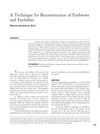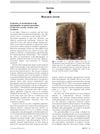 June 2020 in “Journal of clinical and investigative dermatology”
June 2020 in “Journal of clinical and investigative dermatology” Nourkrin® Woman with Marilex® improves hair growth, appearance, and confidence in women with hair loss.
 August 2008 in “European Neuropsychopharmacology”
August 2008 in “European Neuropsychopharmacology” Some teenagers with anorexia nervosa have worse cognitive abilities, especially in visual and spatial tasks, and this is more common in those with a lower body weight.
[object Object]  3 citations,
June 2013 in “Journal of Dermatology”
3 citations,
June 2013 in “Journal of Dermatology” Hairpieces improve quality of life for women with hair loss.
 78 citations,
February 2011 in “Canadian Medical Association Journal”
78 citations,
February 2011 in “Canadian Medical Association Journal” Acne treatment varies, with topical and systemic therapies effective, and more research needed on treatment order and long-term effects.
 22 citations,
January 2013 in “International Journal of Trichology”
22 citations,
January 2013 in “International Journal of Trichology” Hair loss is often linked to thyroid problems, especially in women and older people, and screening for thyroid issues is advised for those with hair loss.
 15 citations,
January 2018 in “Annals of Dermatology”
15 citations,
January 2018 in “Annals of Dermatology” Wigs significantly improve the well-being of people with severe hair loss.
 15 citations,
May 2005 in “Seminars in Plastic Surgery”
15 citations,
May 2005 in “Seminars in Plastic Surgery” The document concludes that hair follicular unit transplantation is an effective method for eyebrow and eyelash reconstruction, with patients happy despite needing regular trimming.
 6 citations,
December 2021 in “Journal of The American Academy of Dermatology”
6 citations,
December 2021 in “Journal of The American Academy of Dermatology” Scalp photography helps patients feel less anxious about hair loss, agree more with doctors on severity, and stay motivated for treatment.
The document concludes that current hair loss treatments have limitations and suggests researching new treatments targeting different factors of hair loss.
 421 citations,
April 2012 in “The New England Journal of Medicine”
421 citations,
April 2012 in “The New England Journal of Medicine” Alopecia Areata is an autoimmune condition causing hair loss with no cure and treatments that often don't work well.
 151 citations,
May 2014 in “American Journal of Clinical Dermatology”
151 citations,
May 2014 in “American Journal of Clinical Dermatology” Effective treatments for male pattern baldness include oral finasteride and topical minoxidil, while topical minoxidil is best for female pattern baldness.
 106 citations,
January 2016 in “Journal of Cosmetic Dermatology”
106 citations,
January 2016 in “Journal of Cosmetic Dermatology” Using platelet-rich plasma with microneedling works better for acne scars than microneedling with water.
 87 citations,
April 2018 in “Biochemical and Biophysical Research Communications”
87 citations,
April 2018 in “Biochemical and Biophysical Research Communications” Exosomes from dermal papilla cells can help grow hair and might treat hair loss.
 49 citations,
November 1992 in “Archives of dermatology”
49 citations,
November 1992 in “Archives of dermatology” Different treatments for alopecia areata have varying success rates and side effects; intralesional steroids are most effective.
 48 citations,
February 2017 in “Journal of Cosmetic Dermatology”
48 citations,
February 2017 in “Journal of Cosmetic Dermatology” The conclusion is to use scalp cooling, gentle hair care, and treatments like minoxidil for managing hair loss from chemotherapy, and stresses the need for more research and collaboration in this area.
 42 citations,
February 2021 in “Signal Transduction and Targeted Therapy”
42 citations,
February 2021 in “Signal Transduction and Targeted Therapy” Hair follicle regeneration possible, more research needed.
 40 citations,
November 2011 in “American Journal of Human Biology”
40 citations,
November 2011 in “American Journal of Human Biology” Stress from being transgender is linked to higher blood pressure at night and more inflammation, which may affect heart health.
 38 citations,
September 2017 in “Oncologist”
38 citations,
September 2017 in “Oncologist” Scalp cooling can help prevent chemotherapy-induced hair loss with a 50-90% success rate and is safe for patients.
 37 citations,
December 2007 in “International journal of clinical practice”
37 citations,
December 2007 in “International journal of clinical practice” Hirsutism is excessive male-pattern hair growth in women, often caused by hormonal imbalances, and requires ongoing treatment to manage.
 35 citations,
October 2012 in “Dermatologic Clinics”
35 citations,
October 2012 in “Dermatologic Clinics” Autoimmune diseases can cause hair loss, and early treatment is important to prevent permanent damage.
 31 citations,
July 2015 in “Clinical, Cosmetic and Investigational Dermatology”
31 citations,
July 2015 in “Clinical, Cosmetic and Investigational Dermatology” Hair restoration surgery effectively treats hair loss with natural-looking results, using techniques like stem cells and platelet-rich plasma.
 30 citations,
January 2014 in “Dermatologic Clinics”
30 citations,
January 2014 in “Dermatologic Clinics” Tight hairstyles, especially on chemically treated hair, can cause reversible hair loss if caught early but may become permanent if not addressed.
 29 citations,
April 2004 in “British Journal of Dermatology”
29 citations,
April 2004 in “British Journal of Dermatology” Women with female pattern hair loss often underestimate how severe it is.
 27 citations,
December 2015 in “Mayo Clinic Proceedings”
27 citations,
December 2015 in “Mayo Clinic Proceedings” The document concludes that lifestyle changes and medical treatments can significantly reduce symptoms of Hidradenitis Suppurativa, a chronic skin condition.
[object Object]  25 citations,
March 2017 in “Archives of Dermatological Research”
25 citations,
March 2017 in “Archives of Dermatological Research” Sinapic acid may help hair growth by activating a specific cell pathway.
 25 citations,
August 2016 in “Journal of Cosmetic Dermatology”
25 citations,
August 2016 in “Journal of Cosmetic Dermatology” The marine complex supplement significantly improved hair growth in men with thinning hair without adverse effects.
 24 citations,
March 2018 in “Pediatric Dermatology”
24 citations,
March 2018 in “Pediatric Dermatology” Testosterone treatment in transgender teens can worsen acne, requiring careful treatment due to mental health and medication side effects.
 24 citations,
September 2014 in “Drug Delivery”
24 citations,
September 2014 in “Drug Delivery” Using microneedles before applying eflornithine cream can make it more effective at stopping hair growth.
 18 citations,
October 2012 in “Dermatologic Clinics”
18 citations,
October 2012 in “Dermatologic Clinics” Early diagnosis and aggressive treatment are key for managing rare scalp disorders that cause permanent hair loss.
 17 citations,
May 2016 in “Journal of Psychosomatic Research”
17 citations,
May 2016 in “Journal of Psychosomatic Research” Illness perception affects mental health and quality of life in Chinese alopecia patients.




























